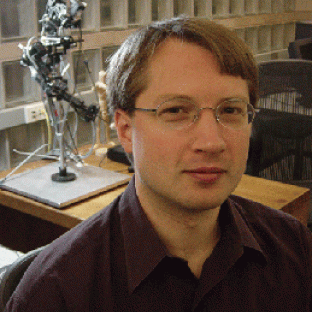
Brian Scassellati
Yale University
Brian Scassellati is a Professor of Computer Science, Cognitive Science, and Mechanical Engineering at Yale University and Director of the NSF Expedition on Socially Assistive Robotics. His research focuses on building embodied computational models of human social behavior, especially the developmental progression of early social skills. Using computational modeling and socially interactive robots, his research evaluates models of how infants acquire social skills and assists in the diagnosis and quantification of disorders of social development (such as autism). His other interests include humanoid robots, human-robot interaction, artificial intelligence, machine perception, and social learning.
Dr. Scassellati received his Ph.D. in Computer Science from the Massachusetts Institute of Technology in 2001. His dissertation work (Foundations for a Theory of Mind for a Humanoid Robot) with Rodney Brooks used models drawn from developmental psychology to build a primitive system for allowing robots to understand people. His work at MIT focused mainly on two well-known humanoid robots named Cog and Kismet. He also holds a Master of Engineering in Computer Science and Electrical Engineering (1995), and Bachelors degrees in Computer Science and Electrical Engineering (1995) and Brain and Cognitive Science (1995), all from MIT.
Dr. Scassellati’s research in social robotics and assistive robotics has been recognized within the robotics community, the cognitive science community, and the broader scientific community. He was named an Alfred P. Sloan Fellow in 2007 and received an NSF CAREER award in 2003. His work has been awarded five best-paper awards. He was the chairman of the IEEE Autonomous Mental Development Technical Committee from 2006 to 2007, the program chair of the IEEE International Conference on Development and Learning (ICDL) in both 2007 and 2008, the program chair for the IEEE/ACM International Conference on Human-Robot Interaction (HRI) in 2009, and chair of the Annual Meeting of the Cognitive Science Society in 2014.
Descriptions of his recent work have been published in the Wall Street Journal (reprinted here), the New York Times Sunday Magazine, Popular Science, New Scientist, the APA Monitor on Psychology, SEED Magazine, and NPR’s All Things Considered.
